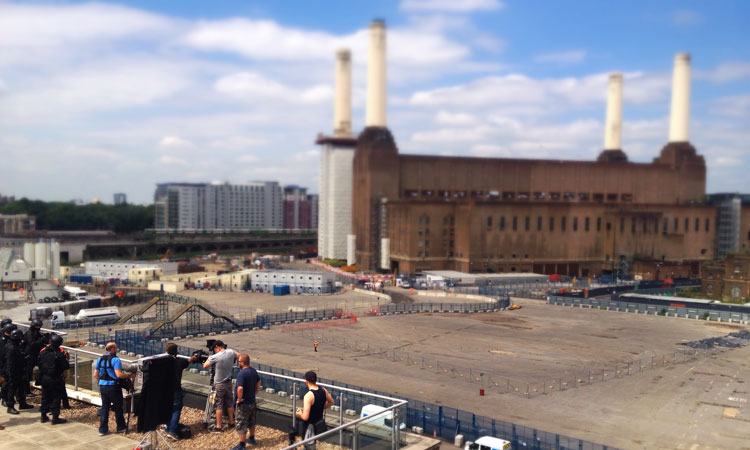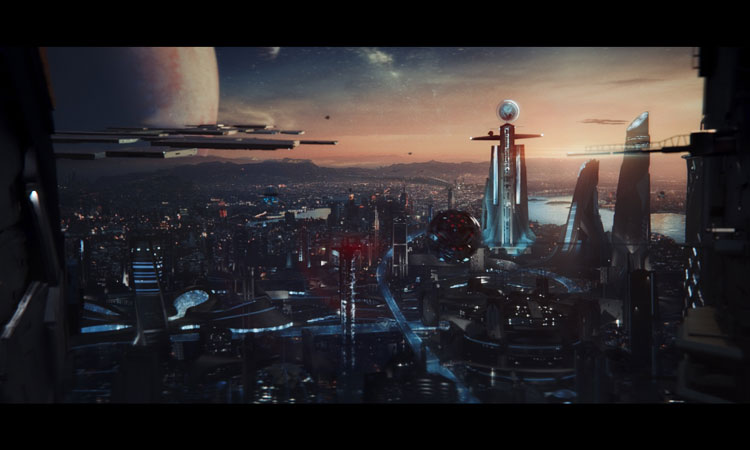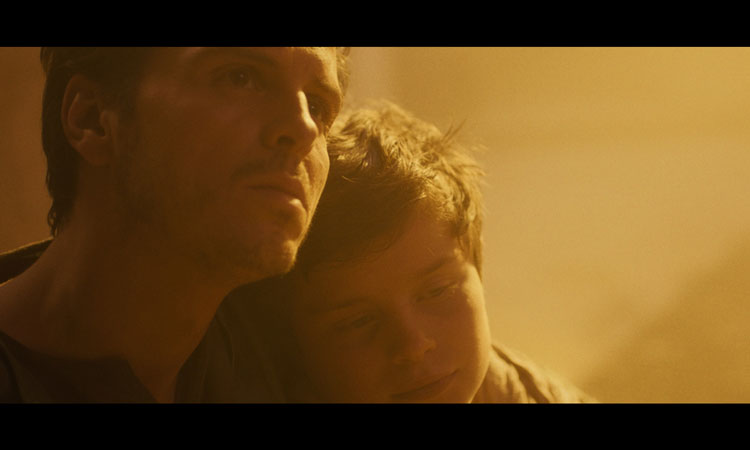Cognition is a short sci-fi story of man who has to face his traumatic past when he’s tasked with an intergalactic mission. A story that focuses on a central relationship with a father and son, Cognition is a personal tale set in the far reaches of space (and a little closer to home!) and stars Andrew Scott (Sherlock) and Jeremy Irvine (Treadstone).
We spoke to Cognition writer and director Ravi Ajit Chopra about his sci-fi inspirations and his connection to the Battersea Power Station…
How did Cognition start for you?
It was quite a journey to be honest! The idea originally came when I was living opposite the Battersea Power Station. It’s such a great, kind of a dystopian building. So many big films have been shot there as well and a lot of filmmakers have filmed there, but just seeing it every day just really sparked my imagination to try and do a film that was actually set in the power station.
I’ve always loved locations in movies. I’ve been on quite a few different locations and movies because of my job at BBC Films. As a producer-director I would normally go on a lot of different film sets and it always fascinated me. It would always really just immerse me into the world of filmmaking. So seeing the Battersea Power Station every day, I started coming up with an idea of a film that could be set there.
The actual premise of the film was to do a sci-fi drama, but just to really make sure that there was going to be something very emotional and personal at the center of it.
What is it about the Battersea Power Station that inspired you?
It’s one of the most famous brick buildings in Europe and I’ve always loved watching classic sci-fi movies that have really arresting locations that just really immerse you into the story and the texture of the movie.
Obviously locations are a huge part in sci-fi production design, from classic films such as Alien, through to Blade Runner. So for this movie, just looking at the Battersea Power Station lends itself to a dystopian setting, which was perfect for me because I’ve always wanted to create a sci-fi drama and I always wanted to try and come up with an idea which was ambitious in scale. Something that was going to be mounted on a larger scale than you would traditionally get on a normal short film. So we could actually try and tell a story on a larger canvas.
I hassled the Battersea Power Station for about a year. I told them the idea about the film that I had. And they finally said ‘okay you can film here, you’ve got two months because we’re about to take down the chimneys and replace them with new ones’ and it went from there!

Why did you decide to explore the relationship between father and son in Cognition?
The story really was very, very personal to me because without giving too much of the story away… The story’s about a son who’s also completing his father’s dream. That’s one of the messages of the movie. For me, my father was always very passionate about films, and it was one of his dreams. So for me it was also an opportunity to tell a story where I could do something very ambitious which would also help to complete my father’s dream as well.
There are some amazing special effects in Cognition. How involved were you with that aspect of the film?
I was actually very much involved because I’m the main producer of the film. We had around 150 people working on the film and when it comes to visual effects and post production, it was pretty insane. We had 350 visual effects shots and I think if you look at that in comparison now to, say, the original Jurassic Park by Spielberg – they had around 70 visual effects shots in the whole feature!
The thing is, if you don’t actually do visual effects to a certain level in today’s climate, people just write off your film straightaway. Especially in this genre; people are so used to seeing things at a certain level. It was my ambition to try and push the envelope about what could be achieved in a short film visually, to really try and capture a specific sci-fi aesthetic and a look. And we worked really, really hard.
The vision was to try and make the actual setting not too fantastical. I really wanted to try and embed it in as much reality as we possibly could. Because really the story is about this father and son relationship and we wanted to try and keep the umbilical cord of the visuals to the characters in the story that we were trying to actually tell.
It was amazing, we did a lot of 2D work, 3D work. We did a lot of green screen work as well, and a bit of previsualisation. We actually worked with Technicolor for 13 months and they played a very very important role. They believed in our film so much that they came on board and they basically helped us to improve every scene in the film. They did some invisible visual effects as well. The grading process is so important because there’s so much that can be done in visual effects during the grading process and I was so grateful to them. They really went above and beyond working with us on this project. I think the film visually looks great due to all the artists and companies [that worked on it].

Was Cognition always going to be a short film?
My goal originally was to do a self-contained short film, because I think there’s nothing worse than someone trying to actually do a feature film and squeezing into a short. So my original vision was to make a self-contained story with a beginning, middle and end; this father and son story. But when I developed those ideas there were plenty of ideas that could go into a feature length movie as well. As we progressed with the film and we started doing some screenings and showing people, everyone was saying that ‘oh, this is gonna be a feature’ so that’s the direction we’re going into now.
The film has been shown on the big screen, which is pretty rare for a short film. How was that experience?
It was really, really exciting because obviously, I worked so hard on this. I really chiseled every single area of the film with an amazing team. I never thought we’d actually get into the cinema to see it on a big screen with an audience [but] we had about nine sold-out screenings. To finally see it on the big screen with an audience, for an idea that started through my bedroom window just looking at the power station, was pretty amazing.
What is it about sci-fi that appeals to you?
Sci-fi is a genre I’ve loved since I was a kid. One of my favourite films from childhood is E.T. but there are many classic sci-fi films I remember watching – Blade Runner, Alien, Total Recall… Sci-fi films resonated with me; [especially those] that had an emotional resonance in the storytelling and with the characters. Those are the sci-fi films that I absolutely loved.
Vertigo is one of my favourite films and even though it’s a drama and not a sci-fi, the actual idea in the film about the main character wanting to go back in time to recapture a moment of his life – the actual storytelling concept was something that you would get within a sci-fi movie. That’s why I love sci-fi – you’re able to tell stories in a non-linear fashion. You’re able to take the audience on a journey, to create different worlds and almost create your own boundaries of the world and what the characters’ stories are.
For me, I’ve got a very vivid imagination and I love going on a bit of a journey. I love being taken to different worlds and being inspired by different settings visually but also by different characters. I think sci-fi can really tell you some amazing emotionally-engaging stories that can be just as hard-hitting as a conventional drama, but they give you something visually great to digest at the same time. That’s what I love about sci-fi in a major way.
I definitely could not have told this story with any other genre. In terms of what I wanted to do, without a doubt.

What would you say audiences will take away from Cognition?
My goal with cognition was to create a story that actually takes the audience on a journey and inspires the audience. One of the key messages of the film is about following your dream. That’s really important to me. I genuinely hope that the audience will go on a journey. I really just hope they emotionally engage with the father and son relationship and feel like they’ve gone on some sort of journey with our characters.
We will be seeing more from this story?
Yeah, 100%, absolutely. We’ve been working on a longer version of Cognition over the last couple of months, and it’s super exciting. We’ve really developed some amazing ideas. We’ve fleshed out the story in the short film into something more ambitious in terms of storytelling. I’m really really excited to turn Cognition into a feature… or a series!
Cognition is available now on demand. Read our review here.
